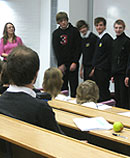SEPnet (the South East Physics Network) is a consortium of university physics departments in the South East of England, working together to promote physics. Physics is a key subject in the modern world, and is currently recovering from a dip in popularity. Our researchers realise the importance of young people continuing to study physics to strengthen the technological and economic development of the UK, and SEPnet institutions have seen a rise in physics undergraduate numbers well above the national average. They are also keen to engage the public with their areas of research, to enable appreciation and understanding of public-funded research, but also to improve informed discussion on contentious issues such as nuclear power. SEPnet is also committed to improving the diversity of people interested in and participating in physics.
Support and opportunities for researchers
Each member of SEPnet has an outreach officer based within their physics department who, in addition to providing subject specific outreach, also supports the researchers in developing engagement projects. While the researchers are keen to engage with the public, they face various barriers including lack of time, difficulty using appropriate language and lack of awareness of opportunities. The outreach officers are ideally placed to promote opportunities to engage with the public to their department and to make appropriate links. They are able to provide one-to-one support for researchers in developing suitable material, with language appropriate for the audience.
Researchers at the Institute of Cosmology and Gravitation at University of Portsmouth are working with local primary schools to bring space into the classroom. The KS2 pupils are at a very different level of understanding to the researchers and the support of the outreach officer has been key to enabling the researchers to communicate their subject at an appropriate level, resulting in a fantastic experience for the pupils and increasing the confidence of the presenters.
A research collaboration between University of Surrey and University College London designed a festival stand on quantum computing which was used at the Royal Society Summer Science Exhibition, Brighton Science Festival, Manchester Science Festival and the Big Bang Fair. The researchers involved initially had little experience in communicating their research to the public and the support of the outreach officer enabled the development of activities that would appeal to a wide range of audiences. The officer also supported the process of the project after initial conception, identifying steps that needed to be taken and other contacts to involve.
In addition to one-to-one support, the outreach team is beginning a course for postgraduate research students in public engagement, to encourage them to develop activities with the public alongside their research from the start of their careers. The training will provide ongoing support through mentoring and peer group sessions as they develop projects. Training will also be available in specific areas, such as creating posters for the public, which will also be open to all researchers.
A public engagement newsletter to all interested researchers will allow opportunities for training and participation to be clearly identified.
Advantages of collaboration
The structure of SEPnet includes a Director of Outreach who enables the sharing of best practice between the officers and external organisations. Regular meetings of the officers allow them to share opportunities and experiences to improve the quality of the engagement activities. This regional approach also increases the reach and profile of many of the activities, for example a joint stand at the National Big Bang Fair based on research at several of the partners, where none of the individual departments would have had the time and resources to attend individually.
Reward and recognition
SEPnet also provides a vehicle for communicating the successes of public engagement, with activities publicised via Facebook and Twitter, so researchers receive wider recognition for their activities. Officers are also aware of external reward schemes and are able to nominate researchers where appropriate. For example, Dr Ben Still of Queen Mary, University of London (a SEPnet partner) won the Institute of Physics Early Career Physics Communicator Award in 2012, after working on a project using LEGO to communicate particle physics, which is now used by all SEPnet departments.
The increase in support for the researchers that SEPnet provides is highly valued by the departments and has resulted in an increase in the number of researchers participating in public engagement, as well as the quantity and quality of engagement projects.

Leave a comment